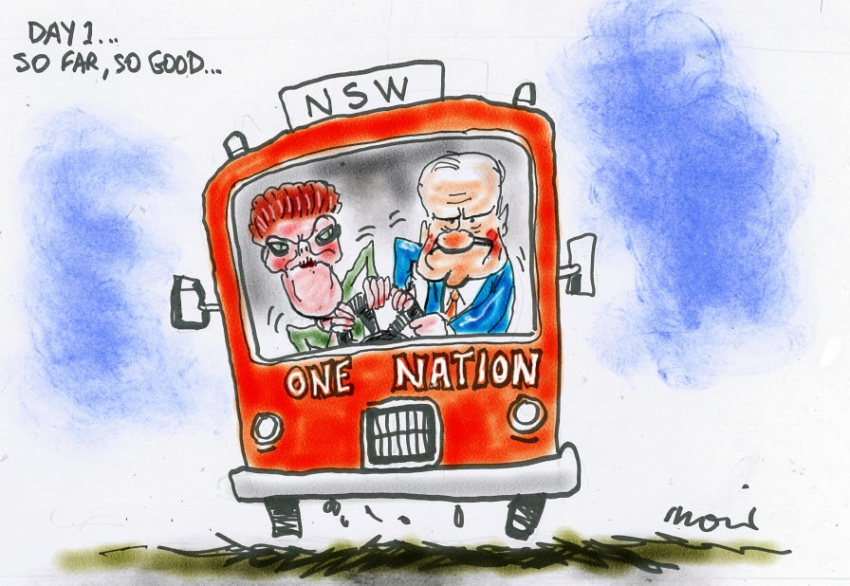
NSW Labor lost the March 23 state election with its small-target strategy, its refusal to challenge the privatisation agenda and its sly accommodation to racism.
Despite a statewide swing of 3.3% against the Liberal-National Coalition, the Gladys Berejiklian government still won 48 seats for another four-year term to finish their agenda of more privatisations, cuts to services and handouts to corporate mates.
Labor also suffered a swing against it (1.1%) because it did not offer a clear political alternative to the Coalition.
Small right-wing parties, in particular the Shooters, Fishers and Farmers Party (SFF) and Pauline Hanson’s One Nation, were the beneficiaries of rising alienation from the major parties and the political process.
One Nation’s statewide vote was about 1.1% because it only ran in 12 lower house seats, but it secured 13% in Camden, 11% in Wollondilly, 10.7% in Maitland, 9.2% in Goulburn, 8% in Holsworthy and 7% in Penrith.
When immigration is being presented as a reason for the decay of services, housing unaffordability and congestion, is it any wonder?
The “Anyone But Nats” campaign delivered huge swings away from the Nationals in Barwon, Orange and Murray. But the far-right SFF were the beneficiaries, as it tripled its lower house representation giving it extra clout with the Coalition which has relied on it to pass legislation.
The SFF also benefitted directly from Labor’s unprincipled preference deal with it in the huge rural seat of Barwon (where the SFF recorded 33.1%) as well as Murray (39.5%) and Cootamundra (15.9%). While Labor preferenced the SFF lower down in 17 other seats, including Coffs Harbour and the Upper Hunter, it still directed preferences to it.
In inner city Sydney, Labor’s refusal to take a clear stand on WestConnex lost it support in inner city areas, and helped the Greens re-win Balmain and Newtown with increased majorities.
Even though Labor’s main preference deal was with The Greens NSW, it still tried to use Jeremy Buckingham’s right-wing split from the party against Balmain Greens MP Jamie Parker with a social media and letter-box campaign alleging the Greens were in too much disarray to be trusted. It backfired badly, with Parker’s vote rising by 6.3%.
The Greens came close to winning in Lismore — where a successful campaign against anti-unconventional gas mining has effectively put the industry on hold — but in the end Labor’s Janelle Saffin took the seat from the Nationals.
There were small swings against the Greens in 47 seats, possibly connected to the party’s fractious debate. Greens members and supporters may either have shifted back to Labor or to the supposedly “neither left nor right” Animal Justice Party, Keep Sydney Open (KSO) and Sustainable Australia Party (SAP). SAP took a share of the anti-immigrant vote, while KSO came in for a lot of criticism for giving second preferences to SAP.
While Labor did have some good policies, such as free TAFE courses for some trades, banning unpaid internships and enforcing better pay and conditions for gig workers, these were overshadowed by its capitulation to right-wing populism and its failure to commit to stopping the Coalition's multi-billion-dollar infrastructure and privatisation scams, such as WestConnex.
Former Labor leader Michael Daley’s racist remarks about “Asian PhDs” taking the jobs of “our kids” and pricing locals out of the housing market was a shock to many progressives, including inside the Labor Party. Despite its disarray, it will wait until after the federal elections to select a new leader.
Labor also thought it could buy the votes of some campaigners by promising lifelines to those fighting to defend the Sirius Building and the historic Windsor Bridge, but refused to commit to a huge expansion in public housing and scrapping the state’s pro-developer planning rules.
A more independent and militant trade union movement pressing home its demands would have made a difference to Labor’s fortunes.
It would certainly have rejected Labor’s accommodation to racism and its small-target strategy. Many unions mobilised their members for pre-polling and on election day without challenging Labor in any way. In this sense, they are complicit in Labor’s devastating loss.
While the Legislative Council vote is still to be finalised, it is already clear that One Nation and the SFF have been given a bigger platform for their dangerous right-wing non-solutions.
The vote for Socialist Alliance in Newcastle, where Steve O’Brien is a well-known campaigner, rose slightly. In Parramatta, Susan Price’s vote is likely to be around the same as in 2011 (discounting the donkey vote) when it last ran in the seat.
Socialist campaigners during the two weeks of pre-poll reported a greater receptivity to their “People before Profit” message, along with greater interest in discussing real solutions to the housing affordability crisis, homelessness and public transport alternatives.
It remains to be seen what numbers the socialists attracted in the Legislative Council. The final results are expected to be known on April 12.
The federal Coalition has been given a leg-up by the Coalition win in NSW. If federal Labor follows in the footsteps of its NSW counterparts it could well do the same: snatch defeat from the jaws of victory.
Even though Australia is not yet experiencing the same degree of economic pain as other rich countries, more and more communities are feeling the pain from neoliberal measures.
The only alternative for the left is to continue to organise with communities fighting back: that is the only answer to right-wing populism.
[Pip Hinman and Peter Boyle are members of the Socialist Alliance and were part of its Legislative Council ticket.]